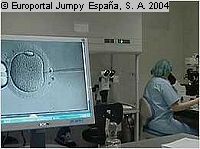Spain approves embryonic stem cell projects
The Spanish government has announced that it will give the go-ahead to four research projects involving embryonic stem cells The government issued a decree on 29 October 2004 to allow such research, and on 23 February the health ministry approved four specific projects, three presented by la Junta de Andalucía, and one from Generalitat Valenciana. A fifth project put forward by Generalitat Valenciana was not authorised. Bernat Soria, chairman of the European Stem Cell Network and head of the Institute of Bioengineering at the University of Miguel Hernandez, Alicante, will lead one of the projects. He will use stem cells to create insulin-secreting pancreatic tissue to treat diabetes. Another project, led by José López Barneo of the hospital Virgen del Rocío in Seville, is designed to help cure neurodegenerative diseases and especially Parkinson's disease. The last two involve fine-tuning techniques used to transform stem cells into other kinds of cells and tissues. 'We have been through exactly five years of ups and downs, including a change of government, but at least we can work in Spain,' Professor Soria told the Sapa news agency. There are currently only three other EU countries that allow such research: Sweden, Belgium and the UK.
Countries
Spain



